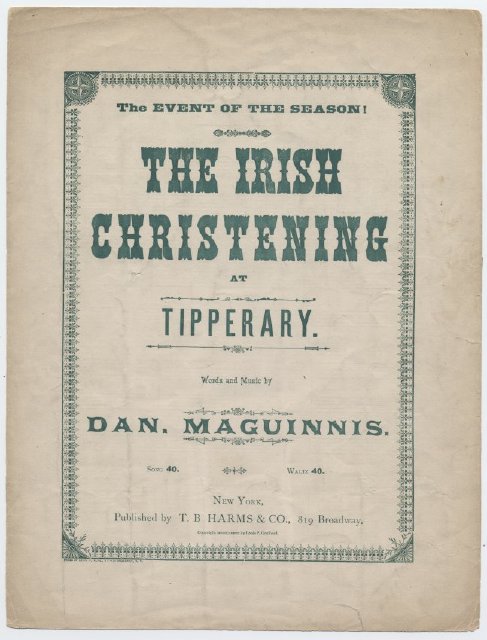Tipperary Christening, The
| AKA | The Christening The Irish Christening The Irish Christening at Tipperary |
| First Published | 1877 |
| Writer/composer | Dan Maguinnis | Roud | RN25272 |
| Music Hall Performers | Harry Melville, JW Rowley, Charles Colette, Lester Barrett |
| Folk performances | Collected from the singing of: Goodwin, Edwin; Australia : New South Wales : 1955 Moss, Barney; Canada : Newfoundland : 1965 Howley, Martin; Ireland : Co. Clare : 1975 Stack, Jack Ireland : Co. Kerry : Listowel 1982 |
From "Six Hundred and Seventeen Irish Songs and Ballads" (c1898, Wehman) It was down in that place, Tipperary, Where they're so airy, and so contrary, Where they kick up the devil's figarie, When they christened my beautiful boy. Tim Doolin, the piper, sat thinking, And a-winking, and a-blinking, A noggin of punch he was drinking, And wishing the parents great joy. When home from the church they came, Father Tom and old Mickey Branagan, And scores of pretty boys and girls As ever you'd wish for to see. And in through the open door, Hogan. the tinker, Lather and Lanagan, Kicked up a row, and wanted to know Why they wasn't asked to the spree. Then the youngster set up such a bawling, Such a squalling, caterwauling, For he got such a terrible mauling, Oh, that was the day of great joy. Then the piper set up such a moaning And such a droning, and such a croning, In the corner his dhudeen was turning, When they christened sweet Dennis, the boy. The aristocracy came to the party - There was McCarty, light and hearty, With Florence Berdelia Fogarty Who said that was French for a name; Dionysius Alphonso Mulrooney, Oh, so spooney, and so looney. With charming Evangellne Mooney, Of society she was the cream. Cora Teresa Maud McCann, Roderick Rooke and Julia McCafferty. Thomas A. Diddymus, Morris McGan, And Clarence Ignatius McGurk; Cornelius Horatio Flaherty's wife, Adolphus Grace and Dr. O'Rafferty. Eva McLanghlin and Cora Muldoon, And Brigadier-General Burke. They were dancing the polka-mazurka, 'Twas a worker not a shirker, And a voice of Vienna la Turker, And the polka-redowa divine; After dancing they went into lunching, Oh, such munching. and such crunching, They were busy as bees at a lunching, With their coffee, tea, whiskey and wine. They had all kinds of tea - they had Shooshong. They had Ningnong. and Drinkdong, 'With Oolong and Boolong, and Toolong, And teas that were made in Japan; . They had sweetmeats imported from Java, And from Youver, and from Havre. In the four-masted steamer "Manarver," That sails from beyond Hindoostan. Cold ice-cream, and cream that was hot, Romeo punch, snowball and sparrowgrass, Patty D. Foy, whatever that means, Made out of goose-liver and grease; Red-headed duck, salmon and peas. Bandy-legged frogs, Peruvian ostriches, Bottled noix, woodcock and snipe, And everything that would please. After dinner, of course, there was speaking, And hand-shaking, and leave-taking, In the corners old mothers match-making, And other such innocent sins; Then they bid a good-bye to each other, To each mother, and each brother, When the last rose I thought I would smother, Well they wished that the next would be twins.
An Irish-American song from the 1870s which featured in the repertoire of at least four different traditional singers in the English-speaking world.

The Irish Christening was first printed as sheet music in 1877 0r ’78. The earliest clear reference I can find is in February 1878 when a Boston newspaper announced that Louis P Goullaud, 86 Tremont Street has issued The Irish Christening, written, composed and sung by Dan Maguinness of the Boston Theatre (The Boston Globe, 17 Feb 1878).
Dan Maguinnis (the spelling of his surname varies) was an actor based in Boston (Massachusetts, USA) who specialised in comic Irish roles. In early printings his song was sometimes given the full title The Irish christening at Tipperary.
The tongue-twisting challenge to memory and breath-control was popular throughout the English-speaking world in the 1880s and 90s. Appearing as printed sheet music, in broadsides and songsters, it was sometimes described as a “banjo song”, which may suggest it was sung in black-face minstrel shows. It was popular in the British Music Halls, but was not associated with any particular performer, it was sung by comics including Harry Melville, JW “Over” Rowley , Charles Colette, and Lester Barrett.
The song was recorded several times commercially in the 20th century – but don’t confuse it with the many other comic songs about christenings; for instance those recorded by Stanley Holloway and Arthur Askey.
Here’s a version of The Tipperary Christening recorded by Willie Brady in the 1960s:
Sources:
- Entries in the Roud Indexes at the Vaughn Williams Memorial Library: https://archives.vwml.org/search/all:single[folksong-broadside-books]/0_50/all/score_desc/extended-roudNo_tr%3A25272
- Kilgarrif Sing Us
- Lyrics: Six Hundred and Seventeen Irish Songs and Ballads (c1898, Wehman Bros, New York)
- US Sheet Music and cover (1884) Irish Fest Collection, Ward Irish Music Archives
- Worldcat entry
- See also College Songs (c1887)